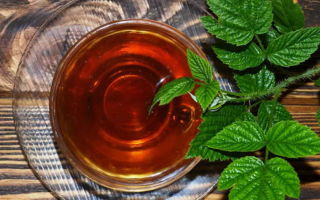Content
- 1 Chemical composition
- 2 What heals and how is raspberry leaf tea useful?
- 3 When and how to harvest raspberry leaves for tea
- 4 How to dry leaves
- 5 Do I need to ferment the leaves
- 6 How to store it correctly
- 7 How to make tea from raspberry leaves
- 8 How often and how much you can drink
- 9 Contraindications
- 10 Conclusion
- 11 Reviews of raspberry leaf tea
The benefits and harms of raspberry leaf tea are worth considering. The natural drink strengthens the body and helps in the treatment of certain diseases, although it must be taken in limited quantities.
Chemical composition
The composition of raspberry tea on the leaves contains all the valuable components present in fresh raw materials. Namely:
- antioxidants and phytoncides;
- vitamins K and PP;
- vitamin C;
- tannins;
- magnesium, potassium and manganese;
- vitamin B9;
- zinc, iodine and copper;
- salicylic acid;
- tocopherol.
The raspberry drink has a pronounced summer aroma and pleasant taste. You can use it for pleasure and well-being.
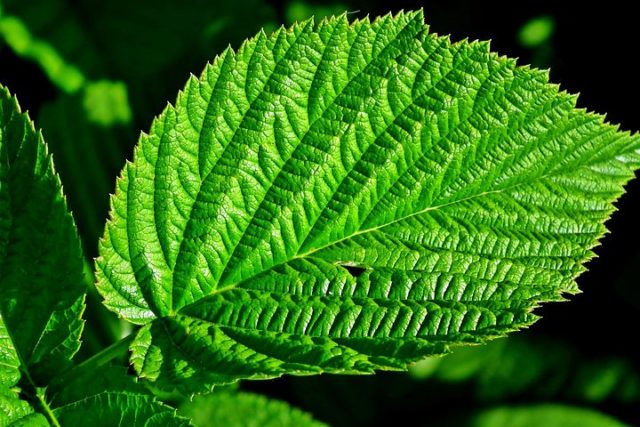
What heals and how is raspberry leaf tea useful?
A raspberry drink made from fresh or dried raw materials has a beneficial effect on the body. Namely:
- suppresses infectious and bacterial processes;
- promotes tissue recovery after injuries and cuts;
- improves the condition of bones, joints and ligaments;
- strengthens immune resistance and helps with ARVI and influenza;
- relieves inflammation of the throat and oral cavity;
- stops external and internal bleeding;
- has a rejuvenating effect;
- improves condition with gynecological ailments;
- normalizes digestion and accelerates metabolic processes;
- helps to get rid of edema and remove toxins and toxins from the body.
Raspberry tea is used in the treatment of colds. It can be drunk with gastritis and diarrhea, with sluggish digestion and heaviness in the stomach. The drink has a good effect on bleeding gums.
The benefits of raspberry leaf tea for women
The beneficial properties of tea with raspberry leaves are often used to treat female diseases. The drink has a good effect:
- with thrush - tea stimulates the immune system and helps to get rid of the fungus quickly;
- with uterine bleeding - raspberry drink speeds up tissue repair and improves the production of leukocytes;
- with heavy periods - tea from the leaves reduces the volume of secretions and improves overall well-being;
- with infertility - the raspberry drink restores the balance of vitamins and microelements, accelerates blood circulation in the small pelvis and, with complex treatment, promotes successful conception;
- with dysfunction of the ovaries - the properties of raw materials help with sluggish work of appendages and with a tendency to the appearance of cysts;
- with painful menstruation - natural tea has an antispasmodic effect and relaxes the smooth muscles of the uterus.
Doctors do not recommend drinking raspberry leaf drink in early pregnancy. It increases uterine tone and can cause miscarriage.In addition, the effect on the developing fetus is not fully understood, theoretically, the drink can harm the child.
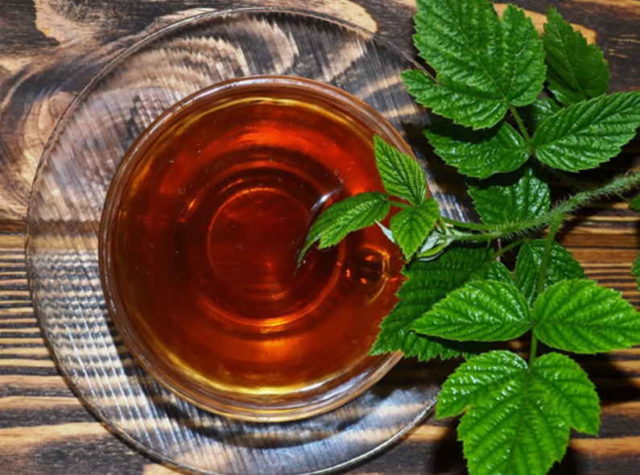
But on the other hand, tea made from raspberry leaves during pregnancy is very useful in the second trimester and shortly before childbirth. It protects against digestive upsets and prevents colds. Some studies confirm that women are less likely to need labor stimulation with regular herbal teas. The drink increases the elasticity of the mother's uterus and helps to avoid internal tears and bleeding.
During lactation, raspberry tea can cause allergies in the baby. For the first time, it should be introduced into the diet no earlier than three months after childbirth and in small portions.
Can I give to children
Tea made from raspberry leaves at home helps to relieve a child's fever in case of a cold and speeds up recovery. You can add a warm drink to your baby's baths. In this case, the remedy will improve the condition of the skin, help get rid of inflammation and irritation.
For the first time, you can give a drink with raspberry leaves to a child from eight months. The initial dosage should be no more than 10 ml. If the baby does not have a negative reaction, gradually the volumes are allowed to increase.
When and how to harvest raspberry leaves for tea
Harvesting raspberry leaves for tea is carried out in the spring before flowering, in late May or early June. During this period, the shrub plates are fresh and contain the maximum amount of juice and nutrients.
The collection is carried out in the morning, preferably before the dew dries, in warm weather. It is necessary to choose only clean plates that are not damaged by pests and diseases, and leave those with holes or black dots on the branches.
They try to collect raspberry leaves for tea evenly from all sides. If you break off the plates from only one edge or strongly expose several branches of a shrub, then the plant will be damaged, and its appearance will also suffer. It is necessary to stop harvesting with the appearance of the first berries, during this period there are less valuable substances in the leaves.
How to dry leaves
The easiest way to harvest raspberry leaves is to dry them. The collected plates are laid out in a thin layer on a tray or baking sheet. Pre-raw materials can be cut into pieces. The tray is placed in a well-ventilated place shaded from the bright sun.
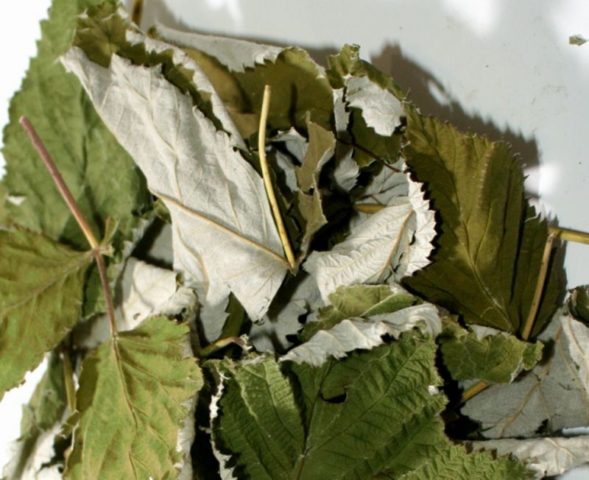
Every two days, the leaves must be slightly agitated so that they dry evenly and do not get damp. After that, the harvested raspberry tea leaves are poured into dry glass jars or cloth bags and stored.
If drying the leaves outdoors or indoors is not possible due to high humidity or poor ventilation, you can use an oven or electric dryer. You need to heat the equipment up to a maximum of 45 ° C. But resorting to accelerated processing methods is undesirable. Naturally dried raspberry leaves retain the greatest amount of valuable substances.
Do I need to ferment the leaves
You can make delicious raspberry tea from simple dried leaves. But the highest quality and healthiest raw materials can be obtained if the collected plates are fermented at home. The process is a little more complicated than conventional drying, but the brewing is more aromatic and rich, and more valuable substances are retained in it.
Fermentation of raspberry leaves for tea is carried out as follows:
- fresh plates are collected, washed in cool water from dust and dirt and dried in the shade on a tray throughout the day;
- dried raw materials are tightly packed in a glass jar, pressed, and closed with a lid;
- the container is kept at room temperature in a shaded place for 24 hours;
- after the expiration date, soft leaves are removed from the jar and thoroughly kneaded and rubbed with hands;
- the resulting mass is collected in a dense lump in a deep plate, covered with a damp clean cloth on top and wrapped in a towel for warming;
- leave the raw material to infuse, the fabric is re-moistened as it dries.
After eight hours, the wet mass of raspberry leaves is poured onto a dry baking sheet, evenly distributed over its surface and sent to the oven at 100 ° C for an hour. Then the temperature is reduced by half and the workpiece is kept in a warm chamber until it dries completely.
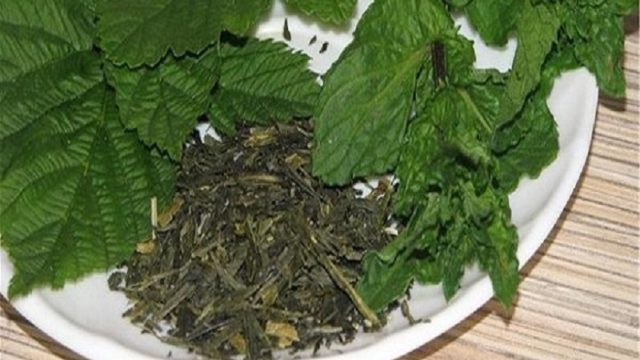
Raspberry leaves should become brittle, but retain a strong and rich aroma. After that, it will remain to pour them into a glass jar and keep in a dark place for at least a month before the first brewing.
How to store it correctly
Self-harvested raspberry leaves should be stored in ceramic or glass containers or in fabric bags. Keep the natural tea leaves in a dark cabinet at room temperature. From time to time, the tea needs to be removed and stirred to prevent moisture and mold from appearing in it. Subject to all the rules, raspberry leaves will be able to retain useful qualities for up to three years.
How to make tea from raspberry leaves
You can make healthy tea from both fresh and dried leaves. The first method is usually used in late spring or early summer, when the plates have just been collected. Dried tea leaves are used in autumn and winter.
From fresh leaves
For making spring tea from fresh plates, you can use both the leaves and young twigs of the shrub. The recipe looks like this:
- the tea leaves are crushed in the amount of a small spoon, while you do not need to turn leaves and twigs into gruel, just cut them;
- raw materials are poured with 500 ml of hot water in a ceramic teapot;
- leave under the lid for 20 minutes to infuse.
Ready tea is poured into cups through a strainer. When it cools down a little, you can add a spoonful of natural honey to it to improve the taste.
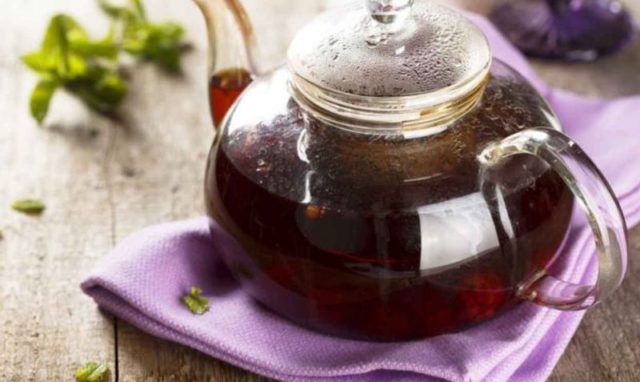
From dried leaves
Dried and fermented tea leaves allow you to enjoy the taste and aroma of the drink in the cold season. You can make tea from raspberry leaves as follows:
- two small spoons of crushed plates are poured into a teapot;
- pour hot water about 80 degrees in a volume of 500 ml;
- cover the kettle with a lid and leave to infuse for only five minutes.
Ready tea is poured into cups through a mesh filter. If desired, you can add honey, a slice of lemon, cinnamon or dried berries to the drink.
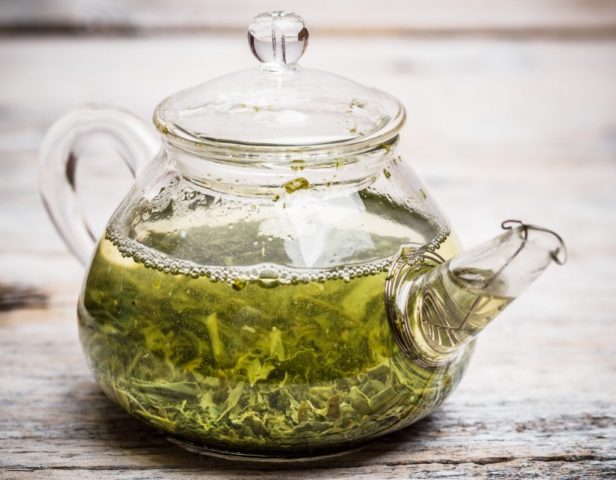
How often and how much you can drink
Raspberry leaf tea is safe for the body and is suitable for daily consumption. Drinking it on a regular basis is especially useful during the autumn viruses and colds. The remedy will strengthen the immune system and help avoid infection.
It is recommended to take no more than three cups of the aromatic drink per day. Tea has mild diuretic properties and can cause dehydration if used in excess.
Contraindications
The benefits and harms of tea made from raspberry leaves depend on the individual characteristics of the organism. It is recommended to refuse the drink:
- with jade and kidney stones;
- with gout;
- with stomach ulcers and hyperacid gastritis;
- with a tendency to constipation;
- with bronchial asthma.
Individual allergy is a strict contraindication to drinking tea. For the first time, you need to try the drink with caution and in small quantities in order to check the body's reaction.
Conclusion
The benefits and harms of raspberry leaf tea are related to each other. But in the absence of contraindications, a natural aromatic drink strengthens the immune system well and helps fight colds. It can be used to improve digestive processes.
Reviews of raspberry leaf tea

